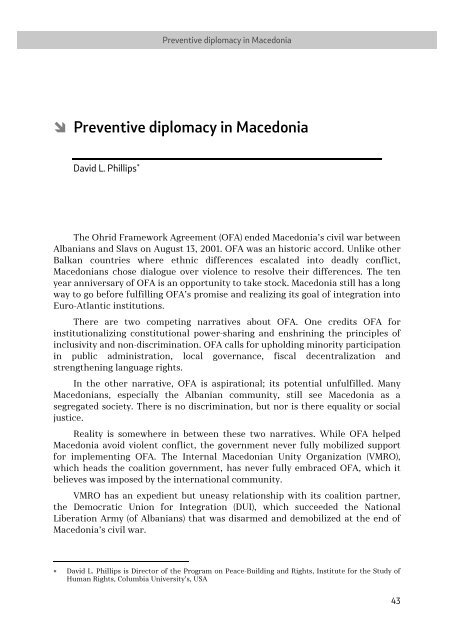- Page 1 and 2: Ten years from the Ohrid Framework
- Page 3 and 4: Content î OHRID FRAMEWORK AGREEMEN
- Page 5: î The OFA reflected in information
- Page 8 and 9: The aim of this scientific research
- Page 11 and 12: OFA - a New Political Philosophy fo
- Page 13 and 14: OFA - a New Political Philosophy fo
- Page 15 and 16: OFA - a New Political Philosophy fo
- Page 17 and 18: OFA - a New Political Philosophy fo
- Page 19: OFA - a New Political Philosophy fo
- Page 22 and 23: James W. Pardew Our topic is the di
- Page 25 and 26: The Road Ahead: The Path of Leaders
- Page 27: The Road Ahead: The Path of Leaders
- Page 30 and 31: Christopher Yvon There has been a g
- Page 32 and 33: Ferenc Kekesi This has in turn fost
- Page 34 and 35: Alexandros Yannis Since 2009, you h
- Page 36 and 37: Arben Çejku The interest of the co
- Page 39 and 40: Speech of the ambassador Skënder D
- Page 41: Speech of the ambassador Skënder D
- Page 45: Preventive diplomacy in Macedonia F
- Page 48 and 49: Livia Plaks At the same time, I rea
- Page 50 and 51: Fatmir Besimi To achieve this, Mace
- Page 52 and 53: Fatmir Besimi A large number of leg
- Page 54 and 55: Fatmir Besimi A model of economic d
- Page 56 and 57: Fatmir Besimi Integration into the
- Page 58 and 59: Arbër Çeliku Bilingualism (trilin
- Page 61 and 62: Challenges of the Ohrid Framework A
- Page 63 and 64: Challenges of the Ohrid Framework A
- Page 65 and 66: Challenges of the Ohrid Framework A
- Page 67: Challenges of the Ohrid Framework A
- Page 70 and 71: Bekim Kadriu Generally speaking, th
- Page 72 and 73: Bekim Kadriu For this reason, the f
- Page 74 and 75: Ali Pajaziti Macedonia as Cultural
- Page 76 and 77: Ali Pajaziti This situation is caus
- Page 78 and 79: Ali Pajaziti A case study: MACEDONI
- Page 80 and 81: Ali Pajaziti References 1. АТАН
- Page 83 and 84: The Ohrid Framework Agreement: Ten
- Page 85: î Studies and analysis ∗ Is Mace
- Page 88 and 89: Elena Andreevska | Memet Memeti | S
- Page 90 and 91: Elena Andreevska | Memet Memeti | S
- Page 92 and 93:
Elena Andreevska | Memet Memeti | S
- Page 94 and 95:
Elena Andreevska | Memet Memeti | S
- Page 96 and 97:
Elena Andreevska | Memet Memeti | S
- Page 98 and 99:
Elena Andreevska | Memet Memeti | S
- Page 100 and 101:
Elena Andreevska | Memet Memeti | S
- Page 102 and 103:
Elena Andreevska | Memet Memeti | S
- Page 104 and 105:
Elena Andreevska | Memet Memeti | S
- Page 106 and 107:
Elena Andreevska | Memet Memeti | S
- Page 108 and 109:
Elena Andreevska | Memet Memeti | S
- Page 110 and 111:
Elena Andreevska | Memet Memeti | S
- Page 112 and 113:
Elena Andreevska | Memet Memeti | S
- Page 114 and 115:
Elena Andreevska | Memet Memeti | S
- Page 116 and 117:
Elena Andreevska | Memet Memeti | S
- Page 118 and 119:
Elena Andreevska | Memet Memeti | S
- Page 120 and 121:
Elena Andreevska | Memet Memeti | S
- Page 123 and 124:
Legal Aspects of implementation of
- Page 125 and 126:
Legal Aspects of implementation of
- Page 127 and 128:
Legal Aspects of implementation of
- Page 129 and 130:
Legal Aspects of implementation of
- Page 131 and 132:
Legal Aspects of implementation of
- Page 133 and 134:
Legal Aspects of implementation of
- Page 135 and 136:
Legal Aspects of implementation of
- Page 137 and 138:
Legal Aspects of implementation of
- Page 139 and 140:
Legal Aspects of implementation of
- Page 141 and 142:
Legal Aspects of implementation of
- Page 143 and 144:
Legal Aspects of implementation of
- Page 145 and 146:
Legal Aspects of implementation of
- Page 147 and 148:
Legal Aspects of implementation of
- Page 149 and 150:
Legal Aspects of implementation of
- Page 151 and 152:
Legal Aspects of implementation of
- Page 153 and 154:
Legal Aspects of implementation of
- Page 155:
Legal Aspects of implementation of
- Page 159 and 160:
The equal distribution of public fu
- Page 161 and 162:
The equal distribution of public fu
- Page 163 and 164:
The equal distribution of public fu
- Page 165 and 166:
The equal distribution of public fu
- Page 167 and 168:
The equal distribution of public fu
- Page 169 and 170:
The equal distribution of public fu
- Page 171 and 172:
The equal distribution of public fu
- Page 173 and 174:
The equal distribution of public fu
- Page 175 and 176:
The equal distribution of public fu
- Page 177 and 178:
The equal distribution of public fu
- Page 179 and 180:
The OFA ten years after, achievemen
- Page 181 and 182:
The OFA ten years after, achievemen
- Page 183 and 184:
The OFA ten years after, achievemen
- Page 185 and 186:
The OFA ten years after, achievemen
- Page 187 and 188:
The OFA ten years after, achievemen
- Page 189:
The OFA ten years after, achievemen
- Page 192 and 193:
Izet Zeqiri | Brikend Aziri This un
- Page 194 and 195:
Izet Zeqiri | Brikend Aziri Ethnici
- Page 196 and 197:
Izet Zeqiri | Brikend Aziri Discrim
- Page 199 and 200:
Perceptions about the Albanian lang
- Page 201 and 202:
Perceptions about the Albanian lang
- Page 203 and 204:
Perceptions about the Albanian lang
- Page 205 and 206:
Perceptions about the Albanian lang
- Page 207 and 208:
Perceptions about the Albanian lang
- Page 209 and 210:
Perceptions about the Albanian lang
- Page 211 and 212:
Perceptions about the Albanian lang
- Page 213 and 214:
Perceptions about the Albanian lang
- Page 215 and 216:
Perceptions about the Albanian lang
- Page 217 and 218:
Perceptions about the Albanian lang
- Page 219 and 220:
Perceptions about the Albanian lang
- Page 221 and 222:
Perceptions about the Albanian lang
- Page 223 and 224:
Perceptions about the Albanian lang
- Page 225 and 226:
Perceptions about the Albanian lang
- Page 227 and 228:
Perceptions about the Albanian lang
- Page 229 and 230:
Perceptions about the Albanian lang
- Page 231 and 232:
Perceptions about the Albanian lang
- Page 233 and 234:
Perceptions about the Albanian lang
- Page 235 and 236:
Perceptions about the Albanian lang
- Page 237 and 238:
Perceptions about the Albanian lang
- Page 239 and 240:
Perceptions about the Albanian lang
- Page 241 and 242:
Perceptions about the Albanian lang
- Page 243 and 244:
Perceptions about the Albanian lang
- Page 245 and 246:
Perceptions about the Albanian lang
- Page 247:
Perceptions about the Albanian lang
- Page 250 and 251:
Arben Hajra | Shpetim Latifi | Vlad
- Page 252 and 253:
Arben Hajra | Shpetim Latifi | Vlad
- Page 254 and 255:
Arben Hajra | Shpetim Latifi | Vlad
- Page 256 and 257:
Arben Hajra | Shpetim Latifi | Vlad
- Page 258 and 259:
Arben Hajra | Shpetim Latifi | Vlad
- Page 260 and 261:
Arben Hajra | Shpetim Latifi | Vlad
- Page 262 and 263:
Arben Hajra | Shpetim Latifi | Vlad
- Page 264 and 265:
Arben Hajra | Shpetim Latifi | Vlad
- Page 267 and 268:
Pubilc opinion research about OFA
- Page 269 and 270:
Pubilc opinion research about OFA
- Page 271 and 272:
Pubilc opinion research about OFA T
- Page 273 and 274:
Pubilc opinion research about OFA E
- Page 275 and 276:
Pubilc opinion research about OFA O
- Page 277 and 278:
Pubilc opinion research about OFA M
- Page 279 and 280:
Pubilc opinion research about OFA A
- Page 281 and 282:
Pubilc opinion research about OFA T
- Page 283 and 284:
Pubilc opinion research about OFA T
- Page 285 and 286:
Pubilc opinion research about OFA W
- Page 287 and 288:
Pubilc opinion research about OFA F
- Page 289 and 290:
Pubilc opinion research about OFA A
- Page 291 and 292:
Pubilc opinion research about OFA I
- Page 293 and 294:
Pubilc opinion research about OFA I
- Page 295 and 296:
Pubilc opinion research about OFA I
- Page 297 and 298:
Pubilc opinion research about OFA C
- Page 299 and 300:
Pubilc opinion research about OFA R
- Page 301 and 302:
Pubilc opinion research about OFA T
- Page 303 and 304:
Pubilc opinion research about OFA F
- Page 305:
Pubilc opinion research about OFA R

















